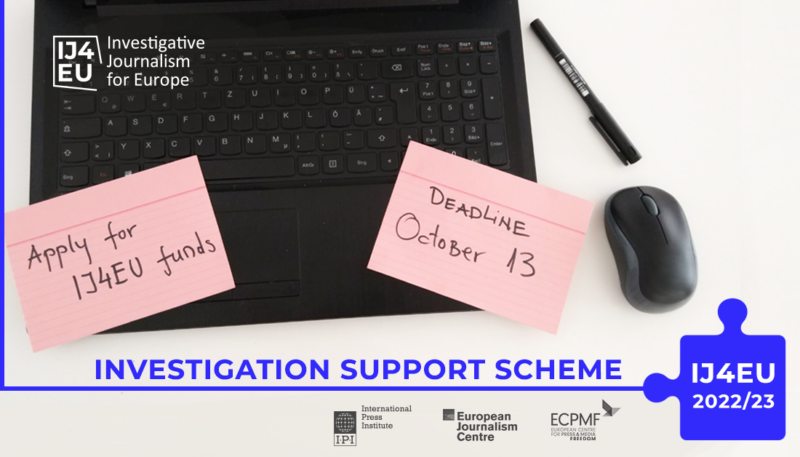Deadline: October 13, 2022
Applications are open for the IJ4EU Investigation Support Scheme 2022/2023. IJ4EU’s Investigation Support Scheme provides financial support to cross-border journalistic teams working on investigations of public interest in Europe.
The European Journalism Centre, together with the International Press Institute (IPI) and the European Centre for Press and Media Freedom (ECPMF), launched the Investigative Journalism for Europe (IJ4EU) Fund, providing a total sum of €1 million in grant funding for cross-border investigative journalism in Europe.
Grants
- IJ4EU’s Investigation Support Scheme provides grants of between €5,000 and €50,000 to support cross-border investigative projects in Europe. The scheme will provide €900,000 in grants in 2022/23. It is managed by the International Press Institute (IPI).
Eligibility
Applications must be sent by teams of journalists and/or news organisations that meet the following criteria:
- They must be based in at least two EU member states, OR…
- They must be based in at least one EU member state and one official EU candidate country (Albania, Moldova, Montenegro, North Macedonia, Serbia, Turkey or Ukraine).
- Third-country team members from further afield are welcome to take part, but they must be part of teams that fulfil the core geographical criteria described above. In other words, they must be part of teams with members based in at least two EU member states or at least one EU member state and one EU candidate country.
- Note that unlike in previous editions of IJ4EU, journalists from the United Kingdom will no longer be treated as equivalent to their counterparts in EU member states. The United Kingdom is now treated the same as any other third country.
- Teams can comprise any combination of members — including journalists working as part of newsroom structures as well as freelancers.
- The proposed project must focus on a topic of cross-border relevance.
- Projects on all topics will be considered. This includes, but is not limited to, corruption, illicit enrichment and financial crime; security, democracy and human rights; environment and climate change; health, including the ongoing COVID-19 pandemic.
Selection Criteria
The jury’s decision will take account of, but not necessarily confine itself to, the following criteria:
- Cross-border relevance
- Relevance of topic to European and local public
- Newsworthiness and added value
- Strength of research and publication plan
- Expected impact and/or reach of the project
- Feasibility of project within project timeline and budget
- Applicants’ experience and journalistic credentials
- Adequate risk assessment
- The urgency of financial need or other assistance
In addition, the guidelines will instruct the jury to consider the overall package of grantees with a view toward ensuring:
- Geographical balance
- Thematic balance
- Balance among types of investigative teams
- Attention is paid to underreported topics as well as investigative topics affecting local communities
Application
Applicants must then complete the following sections:
- Project description. A brief explanation of what they plan to investigate. It is understood that this outline may include tentative or so far unproven conclusions, but it must give a clear indication of the story the team hopes to tell and how it plans to substantiate it.
- What new information will the proposed investigation reveal?
- Project relevance. An indication of why this story (if proved and publishable) would be a contribution to the public interest in the countries involved and/or in the EU more broadly.
- Research and publication plan. A description of the proposed research and activity timeline for the investigation and outline of the broadcast, publication or dissemination plan for the material.
- Risk assessment. A description of the main risks associated with the completion of the project and how the team plans to mitigate against these risks.
- Expected legal needs. A summary of the level and type of legal support that applicants foresee. Applicants must also include a line in their budgets for routine legal screening.
- Any anticipated tools, software, databases etc required to conduct the investigation. Applicants are expected to include a line in their budgets for any such resources.
- Uploaded letters of intent from publishers or broadcasters.
- Total amount requested from IJ4EU (in EUR).
- Uploaded project budget. Applicants are encouraged to use this model budget.
- Budget justification. Any additional information needed to justify the costs included in the budget.
For more information, visit Investigation Support Scheme.

